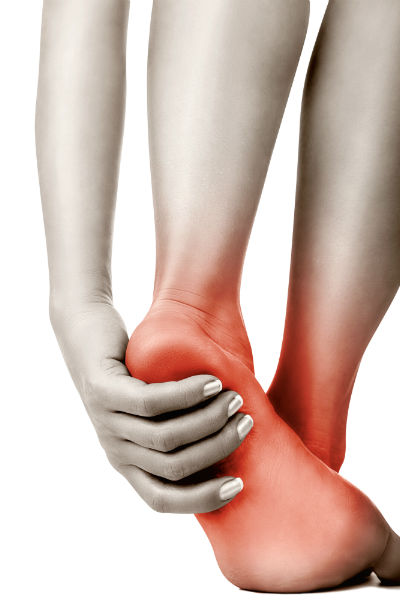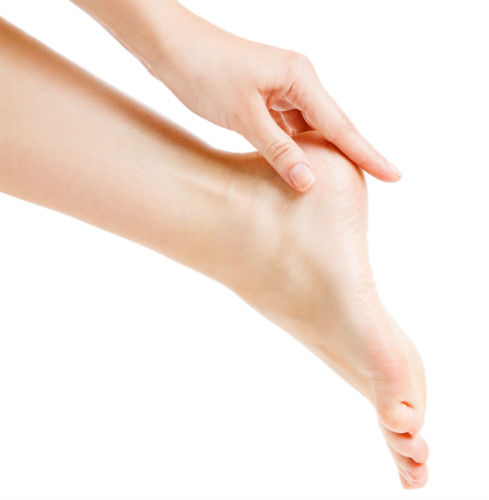Heel pain is a highly common problem—one that can keep you from participating in your favorite activities. If that isn’t bad enough, you have to contend with the fact you’re in pain.
This particular problem has several possible root causes—such as plantar fasciitis, Achilles tendinitis, heel spurs, and Sever’s disease—but we have good news:
You can find the relief you deserve here at Wisconsin Foot Center!
Our expert foot doctor—Andrew Marso, DPM—has experience in helping Wisconsinites like you overcome heel pain so you can get back to doing those things in life you love to do.
Why does your heel hurt?
The best starting point to finding a solution to any problem is identifying the root cause. In this case, there are a couple of key reasons why heel pain often develops:
- Foot structure. If you aren’t familiar with foot anatomy, you should know that your heel bone (calcaneus) is the anchor for two very important connective tissues—the Achilles tendon and plantar fascia. We’ll explore this more shortly, but you experience heel pain when one (or both) of these tissues is injured.
- Physical stress and force. Along with structure, the simple fact that heels endure tremendous force loads, even during an average day, is certainly a contributing factor to many heel pain conditions.
With regard to that second factor, your landing foot has to sustain forces that can reach twice your own body weight with every step. A tiny woman who weighs 110 lbs. is going to place as much as 220 lbs. in force on her feet when she walks. A man who weighs 200 lbs. (slightly more than average for an American male) can put 400 lbs. on his landing foot.
All of that weight can really add up over the course of the day!
Naturally, these structural and physical stress elements are intertwined. It only makes sense that the Achilles tendon and plantar fascia are more likely to become injured when faced with excessive force loads.

 What specific conditions cause heel pain?
What specific conditions cause heel pain?
Heel pain is a highly common problem—something that can be attributed to the fact it’s a symptom of several different conditions and injuries.
We noted some earlier, but let’s take a closer look at these medical issues:
- Plantar fasciitis. For adults, this is the leading cause of heel pain. In this case, it’s usually easy to recognize the injury when you experience sharp, stabbing pain with the first steps of the day. The location will be the bottom of the heel, which is where the plantar fascia connects to your heel bone.
- Achilles tendinitis. If you are an active, middle-aged adult who experiences pain in the back of the heel that’s more intense during (and immediately following) physical activities, you might have this common sports injury. In this case, it is your body’s thickest and strongest tendon—the Achilles—that has become injured in response to excessive strain or overuse.
- Heel spurs. A bone spur isn’t necessarily painful in and of itself. In fact, you would be just as likely to be aware of one as you are aware of your bones (when they aren’t broken). There is a problem, however, when the calcium buildup—which your body has produced in response to excessive pressure on a concentrated area—digs into soft tissues. Heel spurs can reach lengths of half an inch (or more!) and are typically found on the underside of the foot, often in conjunction with plantar fasciitis.
- Sever’s disease. Whereas plantar fasciitis is the most common source of adult heel pain, Sever’s is frequently the culprit for adolescents and teens. Despite the name, this isn’t actually a disease. Rather, it’s a type of “growing pain” that happens when the heel bone reaches physical maturity before the Achilles tendon—a situation that causes tugging on the back of the heel bone. The pain is usually strongest during and following activities. Because this condition will often resolve itself as the Achilles matures, treatment is more focused on addressing symptoms, and not “correcting” the condition.
So how can we help?
Of course, the answer to this question will depend on your specific circumstances. (Remember, we treat every patient on a case-by-case basis, because all feet have unique variances in structure and gait patterns, and everyone has different lifestyles and goals.)
That said, some of the more common treatment options include:
- RICE therapy. No, we aren’t talking about the starchy grain, but rather using Rest, Ice, Compression, and Elevation to relieve pain and keep swelling to a minimum. Dr. Marso will likely incorporate some, if not all, of these into your treatment plan.
- Medication. The odds are pretty decent you can benefit from nonsteroidal anti-inflammatory drugs (NSAIDs). If that sounds intimidating, don’t worry—we’re basically talking about time-tested staples like ibuprofen, aspirin, and naproxen sodium. With regard to prescription NSAIDs, the most well-known might be celecoxib (Celebrex is the name brand).
- Physical therapy. While we might need to recommend an actual physical therapist for very extreme cases, Dr. Marso can often prescribe specific stretches and exercises to address a current issue (and help you prevent recurrence!).
- Orthotic therapy. When the issue is related to biomechanical processes or you’d benefit from additional cushioning in targeted areas, we may prescribe a pair of custom orthotic devices. It’s important to note that these are not the same as store-bought insoles (like Dr. Scholl’s) that you can pick up at retail stores and nationwide pharmacy chains.
Learn more about custom orthotics here!
Professional foot care for Milwaukee County
The best way to know exactly why your heel hurts—and what can be done about it—is coming to see us so Dr. Marso can evaluate the problem and create your customized treatment plan.
Foot pain is something that should never be ignored! Instead, take a moment to contact Wisconsin Foot Center and request an appointment so you can receive the expert care you need. Call our Hales Corners, WI office at (414) 425-8400 or contact us online.
The Professional Foot Care You Need
The best way to know exactly why your heel hurts and what needs to be done about it is coming in so we can evaluate the problem for you. Foot pain is something that should not be ignored, so make sure you contact Wisconsin Foot Center for the expert diagnosis and treatment you need. Call our Hales Corners, WI office at (414) 425-8400 or contact us online.
© Wisconsin Foot Center. All Rights Reserved. Website & Marketing By Podiatry Growth

